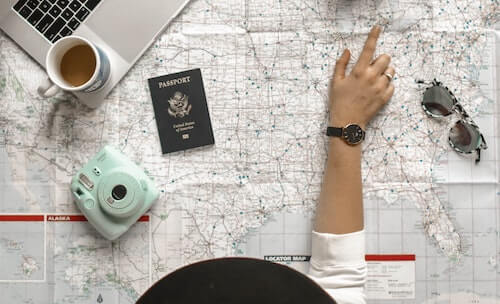It’s hard to disconnect from social media as a casual user, so imagine how hard it is to unplug when it’s your job.

There’s always something new in the world of digital media. An unexpected reaction to your social media posts, a newsworthy event that needs your brand to respond quickly, or negative feedback that goes viral and has to be handled ASAP.
The more “on” and regularly connected you are, the more important it is to take a break. It’s necessary for both your creativity and your mental health (and maybe even your physical health if your job feels stressful).
But how do you break away? The wheels have to keep spinning even if you’re snoozing on the beach.
First Things First: What Does a Paid Media Manager Do?

Paid media managers (also referred to as “digital media managers”) have a lot on their plate.
Here are just some of their responsibilities:
- Oversee all digital media, including social media and websites
- Build and manage social media profiles and branding
- Create and curate content to be shared online
- Determine the platforms that are best for specific pieces of content
- Manage and analyze search and social marketing campaigns
- Ensure every platform is consistent with the brand
With communication and social media at the heart of what paid media managers do, you can imagine how difficult it is to stop doing those things. Plus, they use their expertise, insight and knowledge to constantly make decisions, and those aren’t skills you can easily teach to another person.
10 Tips for Taking Vacation as a Paid Media Manager
Digital media management is a job that never sleeps and never takes a vacation – but as a digital media manager, you deserve time off. Here are 10 tips for before, during and after your vacation.

Source: Unsplash
1) Take Off More Days Than Your Vacation Duration
If you’re going away on an extended trip (like a week instead of a long weekend), add a day or two onto it when scheduling time off. If anything goes wrong, like a missed or canceled flight, you won’t have to run everything from a faraway location that has bad WiFi and no cell reception.
Also, even if you get back to work on time, you’ll be glad you have all of your work handled for the extra couple of days. Those first days back are going to be overflowing with admin to handle – emails, phone calls, questions from your team, debriefing – so clear your first few days for just that.
2) Start Planning Well in Advance
You still have to prepare in advance even if all you’re doing is escaping for two nights.
The beauty of social media marketing is that there are a lot of tools out there to help you plan ahead. You probably schedule your content ahead of time already, so you just have to make sure that what you’re loading into the scheduling software will cover the days you’re gone – and a few extra, too, since it’s always hard to get back into work mode following a trip.

Source: Buffer
Manage Your Marketing Campaigns in Just a Few Easy Clicks.
Shirley is here to simplify the process for you!
>>>Click here for more info<<<
3) Over-Prepare Your Team
You won’t be able to schedule everything, which means your team is going to have to jump in more than normal to do what’s required. Things like monitoring and responding to comments, posting (valium) Instagram Stories content and live streams, and answering DMs have to be handled by an actual person.

Your team should know all the details about the marketing campaigns that will be running when you’re away. Tell them what to expect and give them a few not-great scenarios that could play out during your trip.
They should know details like:
- Your company’s general social media schedule.
- Regular posting times and anything that’s different from the norm.
- The tools used for social media management, plus login information.
- Community management best practices (like how to respond to negative reviews).
Create a guide with all of this information clearly laid out. If you already have a manual that covers this info, go through it and ensure it’s up-to-date.
4) Choose a Point Person
Have a point person who will handle everything while you’re away. Think of them as another you.

Consider having them run everything for three days prior to your trip so you can handle any questions and smooth out rough edges by the time you leave. At the very least, have them shadow you for about a week, and make sure you schedule time to answer their questions.
5) Create an Emergency Plan (and Put it in Writing)
An emergency plan means that everyone will know what to do if things go awry – and “everyone” includes you. You want to know your team is able to handle pretty much whatever happens.

Your emergency plan should include:
- The events that are considered emergencies. A few more bad reviews than usual are not an emergency. A post about a limited-time sale that didn’t go live when it should have is an emergency.
- Who should be notified? Which members of the team are prepared to handle an emergency? When does the team get your point person involved? Is there a third party who can be brought in? For example, if your point person gets locked out of your Instagram account because he doesn’t have the password, does he have to contact you – or can you give your login information to someone you trust, like a family member, who can be contacted instead?
- How to notify you. At what point should you be notified? How should you be contacted? If you’re only checking your email once a day, there should be a more direct line to you, like your number at the hotel or an emergency email address that you get alerts for on your phone.
The goal of the emergency plan (or plans) is for your team to handle as much as possible on their own without interrupting your vacation. If you’re going to be brought in to troubleshoot every time something goes wrong, there’s no need for an emergency plan in the first place.
6) Totally Unplug While You’re Away (Or Unplug as Much as You Possibly Can)
Don’t get lost in a strange city because you vowed to not use your phone even for GPS. And it’s okay to keep your phone on so you can take photos of your trip. What “unplugging” means in your case is that, barring an emergency, you don’t post, read comments or check in with your team.

This will get easier as the days go on. You’re basically just forming a new habit.
Here are a few tips to help while you’re flexing this new muscle:
- Remove apps from your phone or sign out of them if they’ll be too tempting. Remember, you set up an emergency plan so you don’t have to be available all the time.
- Use an app that will block the apps you don’t want to access, or set time limits if you have an iPhone.
- Even something simple like putting your phone in airplane mode will make you think twice before checking your accounts – especially if you check notifications out of habit, without even realizing it.
Bonus: You’ll probably leave a few of those time-sucking apps off your phone after your trip, once you’ve realized you don’t actually need them.
7) Designate Specific Check-in Times
Without boundaries, enjoying your vacation and getting away from work is just a hop, skip and email check away from being available around-the-clock. If you work a ton, scaling back 75% is still not a vacation. You really want to do the bare minimum (or, ideally, nothing at all).
If you must stay connected, set boundaries for yourself. For example, check email 1-3 times per day at designated times, and only handle emails that absolutely have to be responded to in-the-moment. You can handle non-emergency comments and emails when you return – that’s why you blocked off a few extra few days for exactly that type of work.

Source: Unsplash
8) Allow For Aspects of Your Job That Feel Great
Nobody said you have to stop learning and thinking just because you’re on vacation.
Stay on top of the parts of your job that will make you feel more relaxed. For example, maybe you enjoy getting up early and reading the latest industry headlines with a cup of coffee or you have a work-related podcast you love listening to. If those things feel indulgent, comforting or inspirational, then continue doing them on vacation.

If you’re a person who loves their job, you can allow yourself to engage with it even if you’re on vacation (so long as it doesn’t get in the way of your trip). You may get even more out of those exercises when you’re taking a break – your mind is clear, you’re rested and you can think creatively or strategically without forcing the issue.
You can’t separate your creativity from your job: it’s who you are, and it’s why you’re so good at what you do. You can’t disconnect from that person on vacation; nor should you want to.
9) Ease Back Into Real Life

Give yourself a few days post-vacation to get back into the swing of things.
Don’t worry about jumping right back into your routine. If waking up at 5 a.m. and scheduling several meetings for the week feels overwhelming, don’t force it. You can ease back into your normal workflow, or even change your workflow if you feel like it’s not conducive to great work.
Consider this: while you were away, you developed new “vacation-only” routines. And they probably made you feel amazing. Think about how you can blend those routines with your work routines for a better balance.
10) Your First Meeting Should Be with Your Point Person

Meet with your point person before meeting with the whole team. Don’t do this first thing, though. Get to work, take a couple of hours to yourself to get your footing, then have your meeting with your point person. They can debrief you about what happened while you were away and prepare you for what the team will bring up during your first group meeting together.
This is also a good opportunity to find out if they saw any areas where your process – either your regular process or the “I’m going on a vacation” process – can be improved.
Bon Voyage ?

The nature of digital media is that it’s always on. The Internet doesn’t turn off.
The same can’t be expected of you, though – you’re human, and you can only be your best if you have time to recharge in between those crazy days, weeks and months of work.
Vacation is actually an integral part of succeeding at work. Instead of plugging along in a way that exhausts you and results in less-productive work, you’ll be rejuvenated and ready to get more accomplished in less time.


